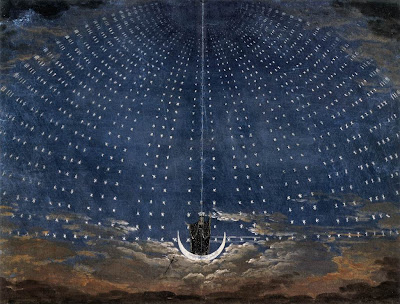The Magic Flute at Regina Opera.
Conductor José Alejandro Guzmán took the opening "mystic" chords very slowly, aiming for clarity over speed. This approach was similar to that taken by the great Otto Klemperer on his EMI recording, leading to a slow but detailed account of the score. The Regina players did well in this music, with exceptional work from the trombones and naturally, the flute.
The supporting cast was strong. Mention should be made of Chrysta Hylton's fine comic turn as Papagena, who sang a final diet with Mr. Tillistrand that was both moving and full of charm. Ray Calderon played Monostatos as a Latin lover, a comic stereotype to be sure but one less offensive than the Moor as portrayed in Emanuel Schikenader's libretto. Saidue Karmo and Artur Brisita made a strong pair of Men in Armor, singing the Bach-like chorale with meaning and force.
 |
| An original set design for Act I of The Magic Flute. |
For the last 42 years, Brooklyn's Regina Opera has been serving up the best of the repertory to enthusiastic audiences in a church hall in Dyker Heights. On Sunday afternoon, the company gave the second of four performances of Mozart's The Magic Flute, offered here in a sturdy, serviceable English translation.
Despite being one of Mozart's most popular operas, the fantastical Flute suffers from over-familiarity and the misperception that the simple story is aimed exclusively at children. The Regina players presented a version that spoke clearly to all generations in the audience, making the opera's two love stories come across as genuine while indulging in the work's mystic pretense.
Conductor José Alejandro Guzmán took the opening "mystic" chords very slowly, aiming for clarity over speed. This approach was similar to that taken by the great Otto Klemperer on his EMI recording, leading to a slow but detailed account of the score. The Regina players did well in this music, with exceptional work from the trombones and naturally, the flute.
The finest voice in this energetic cast was Maryam Amatullah-Wali, who brought a silvery, yet warm-sounding soprano to the role of Pamina. She found the steel inside the character for her confrontations with Monostatos and sang a warm "Bei mannern" with Papageno. Ms. Amatullah-Wali was at her finest in the second act, delivering a ringing "Tamino, mein" at the opera's climax.
Her Tamino was tenor Chad Kranak, who overcame some rough early moments and found his groove in the second half of the first act. Mr. Kranak has a pleasing onstage manner. He was well-matched with David Tillistrand, a fine, comic Papageno who stole the show with an entrance that involved the merry bird-catcher flirting with the concertmaster and inadvertently netting Mr. Guzmán's head.
More problematic was the Queen of the Night, sung here by Elizabeth Treat. Ms. Treat was burdened with a costume that looked like a cross between David Bowie and Ace Frehley from KISS. She scraped the upper register required for this role, but her flutey tone in "O zittre nicht" sounded more like a counter-tenor than a soprano. She was better in the famous "Die holle rache," hitting the high Fs to the audience's delight.
 |
| Reasonable rates available. |
Lastly, bass Jay Gould was a resonant Sarastro, despite the fact that his volume diminished in the role's deepest notes, With his white wig and caftan, he played the chief of the priestly order as a sort of proto-hippie, bringing peace, love and wisdom to the opera's protagonists. Given the controversy over this work's Masonic orientation and historical connotations, this innocent approach may have been for the best




